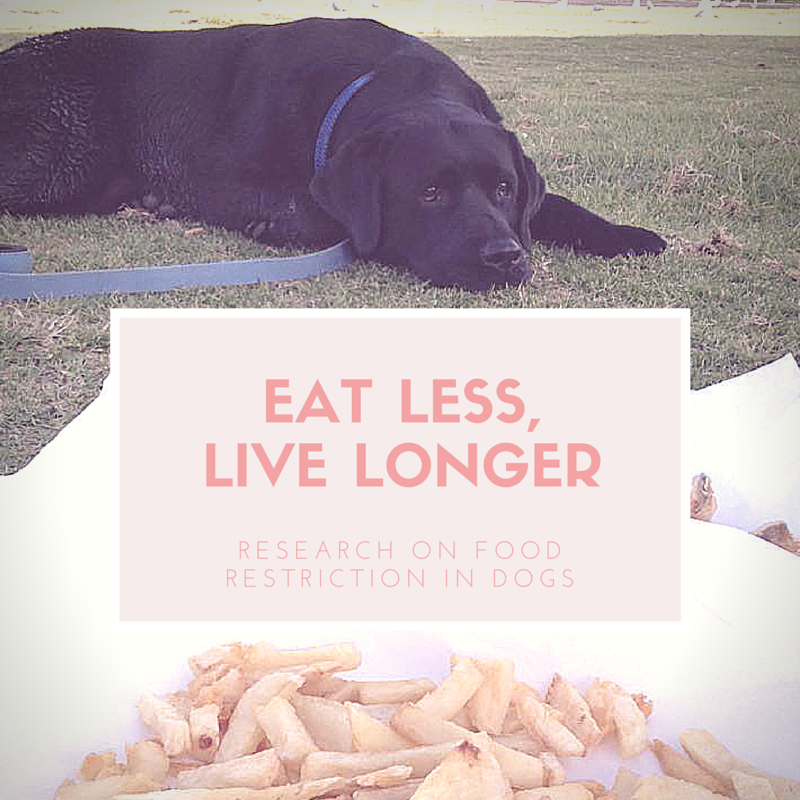Eat Less, Live Longer
![]() Last year I went to a Primal Paws workshop in Adelaide, and Dr Jamie mentioned research which suggested that dogs that stayed skinnier lived longer healthier lives. Obviously, I had to know more, so I found the 2002 paper on Labradors.
Last year I went to a Primal Paws workshop in Adelaide, and Dr Jamie mentioned research which suggested that dogs that stayed skinnier lived longer healthier lives. Obviously, I had to know more, so I found the 2002 paper on Labradors.
 The basic design of this study (published in 2002) involved 48 labradors. Each labrador was buddied with another labrador at 6 weeks of age (choosing a buddy based on sex and body weight), and then one pup in the pair was fed 25% less than the other dog in the pair throughout life.
The basic design of this study (published in 2002) involved 48 labradors. Each labrador was buddied with another labrador at 6 weeks of age (choosing a buddy based on sex and body weight), and then one pup in the pair was fed 25% less than the other dog in the pair throughout life.
The focus on his study was basically to see the effect that 25% less food had on longevity and other illnesses in dogs. Apparently, many other studies have been done, primarily on rodents, that have shown that less food (regardless of many other variables) results in longer living and healthier animals. However, this research hasn’t been conducted on larger mammals. (This is the first study, that the authors know of, on dogs. Research on primates is ongoing.)
Each year, for at least 14 years, the dogs alive had bloods taken and body composition scoring. Also, their deaths and any diseases that occurred were recorded alongside the year of acquisition.
The main points:
-
Dogs that had less food’s median life span was significantly longer.
Dogs who were fed less had a median lifespan of 13 years, compared to 11.2 years in their partners. -
“The onset of clinical signs of chronic disease generally was delayed for food-restricted dogs.”
For dogs who had oestoarthritis (which was 43/48 dogs), 43 of these dogs required treatment. For controlled fed dogs, first treatment was needed from 6.8 years to 12.9 years. In the restricted fed group, first treatments was needed from 7.9 years to 14.1 years. Mean age was 10.3 in controlled group and 13.3 in restricted group, which was statistically significant.
39 dogs required treatment for 1 or more chronic conditions. “Mean age to which 50% of the dogs in each group survived without requiring treatment for a chronic conditions as significantly lower for the controlled-feeding group than for the restricted-feeding group.” -
”No signs of nutritional deficiency (eg, progressive weight loss and general or specific clinical signs of a nutrient deficit) occurred during the study.”
It’s important to note that, even though 24 dogs were fed a lot less food, they were still healthy! - Dogs in both groups had increased body condition scores (i.e. were fatter) from 6-12 years.
This is just an interesting tidbit that illustrates a lull in the body’s metabolism at this particular point of time.
Problems
It’s hard to know whether this study will be replicable in different breeds or different genetic stock. Considering the history in the duplicity of results in other species, I think we can be pretty confident these results are solid. However, more research does this would be great.
Even though 48 dogs is a pretty good number for a sample, a bigger sample size is always better.
One question I found myself asking throughout this is, if it’s better to feed less food of a higher quality to maintain weight, instead of more food of poor quality? This would also be a good area for further research.

Roxy mourns over the understanding that it’s better for her to have 25% fewer chips.
Take home points:
- Feed your dog less. It might live longer.
- Feed your dog less. It might be longer before it needs treatment for oestoarthritis (if they develop the condition).
- Feed your dog less. It might be longer before it needs treatment for any chronic condition.
- Feed your dog less, especially once he turns 6 years old.
- Point from the actual text: “We recommend that for purposes of health and longevity, dogs be fed to maintain a body condition score less than 5.”
I’ve never been happier with my decision to keep my dogs at a lean weight throughout life.
Reference:
Kealy RD, Lawler DF, Ballam JM, Mantz SL, Biery DN, Greeley EH, Lust G, Segre M, Smith GK, & Stowe HD (2002). Effects of diet restriction on life span and age-related changes in dogs. Journal of the American Veterinary Medical Association, 220 (9), 1315-20 PMID: 11991408
Further reading:


